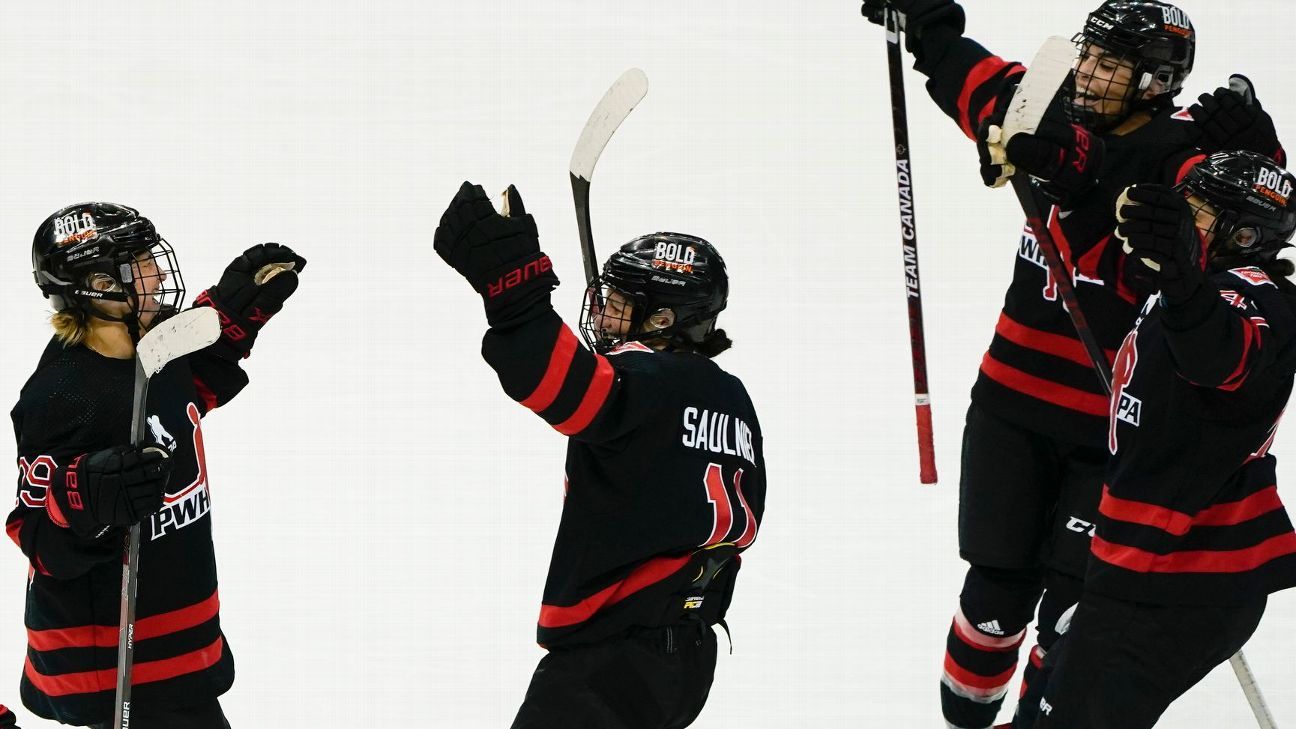PITTSBURGH — Upon adding yet another notch to her “Captain Clutch” nickname, and against the Americans yet again, Canadian Marie-Philip Poulin focused less on the past and more on the future in seeing a glimpse of what professional women’s hockey could resemble one day soon.
The “Rivalry Rematch” on Saturday was an exhibition organized by the Professional Women’s Hockey Players’ Association, played on an NHL rink and with monetary backing from league and corporate sponsors, with a crowd of 5,400 on hand and broadcast nationally in both countries. And it was a showcase that coincided with the PWHPA intensifying discussions with select NHL teams and its sponsors to launch a pro league within the next year.
“Obviously, today was special. It’s more than a winner or loser to be honest,” said Poulin, who scored 2:13 into overtime to secure a 4-3 win.
“Walking in, treated like professionals. I think that’s something that we really wanted for years,” she added. “It was more about women’s hockey and I think we made a statement today.”
Poulin’s goal was the exclamation point, coming a little over three weeks after she scored the final two goals in Canada’s gold medal-winning 3-2 win over the U.S at the Beijing Winter Olympics. The four-time Olympian’s list of clutch goals includes three gold-medal clinchers — all against the United States — and the overtime goal in Canada’s 3-2 gold-medal win over the Americans at the world championships in August.
With teams playing three skaters aside, Poulin drove to the right post and had her centering pass deflect off U.S. defender Megan Keller and through the legs of goalie Nicole Hensley.
Blayre Turnbull, Jamie Lee Rattray and Jocelyne Larocque also scored for Canada, which has won five consecutive meetings against its cross-border rival.
Hilary Knight, Hayley Scamurra and Hannah Brandt scored for the Americans.
With Penguins captain Sidney Crosby watching from a suite, the U.S. rallied from a pair of one-goal deficits and took a 3-2 lead on Scamurra’s goal at 7:46 of the third period. Canada responded 24 seconds later with Poulin setting up Rattray snapping in a shot from the right circle.
The game featured uneven rosters, with the U.S. dressing just 14 skaters to the Canadians’ 17, and lacked the intensity of both meetings in Beijing, or even the two nations’ six pre-Olympic tuneups.
Putting aside the loss and America’s fierce on-ice rivalry with Canada, Knight called the event “a wonderful glimpse into the near future” by crediting the PWHPA and Penguins for pulling it off in 11 days.
The PWHPA was formed three years ago following the demise of the Canadian Women’s Hockey League with an objective to form a pro league with what it called a sustainable economic model with more robust support for players.
“We’re closer than we’ve ever been,” PWHPA chief Jayna Hefford told The Associated Press in confirming discussions have ramped up.
“There’s a lot of interest, a lot of conversations going on. I think teams, now more than an ever, are seeing how accretive it is to their business,” Hefford added. “It’s not about the right thing to do. It’s not anything other than this is good for our business and this is good for the business of hockey.”
The Washington Capitals and Toronto Maple Leafs have been among the strongest and most notable PWHPA partners. The Penguins have several ties to women’s hockey in becoming the NHL’s 11th franchise to partner with the PWHPA.
“We’ve got to figure out a long-term plan that includes the National Hockey League, and I know they’re willing to do it,” said Penguins president Brian Burke, a long-time proponent of women’s hockey and the PWHPA. “We’ve been slow to figure out the best path, but it’s not because the NHL is not behind it. It’s just trying to figure out the best way to go.”
Citing the level of skill on display during the women’s Olympic tournament, Burke said: “I think we’re poised to take the next big, big step and that’s going to happen, I think, in the next 18 months.”
The women’s players would prefer it happened yesterday, while understanding how critical it is for the funding and partnerships to be in place before launching on their own.
“While it’s been frustrating these past couple of years to not have full seasons, to not have leagues to play in, we understand that this is bigger than ourselves,” Canadian forward Brianne Jenner said. “And we’re willing to go through the proper process and make sure that whatever is next to come is going to last indefinitely.”
It’s why Hefford has been cautious in releasing too much information or placing a timetable on when a pro league might be established.
“We don’t want to do this again. We got to make sure we get it right this time,” she said.
Penguins coach Mike Sullivan cited his daughters as key reasons to support women’s hockey.
“My daughters looked up to these girls, the Cammi Granatos and the girls that won the gold medal at the Olympics. And they’re not unlike boys in that regard, where they are looking up to the Crosbys and the Malkins and the Letangs,” Sullivan said, referencing Penguins stars. “That’s what inspires them to want to play. … I think we all have a responsibility to try and grow the game in that regard.”
